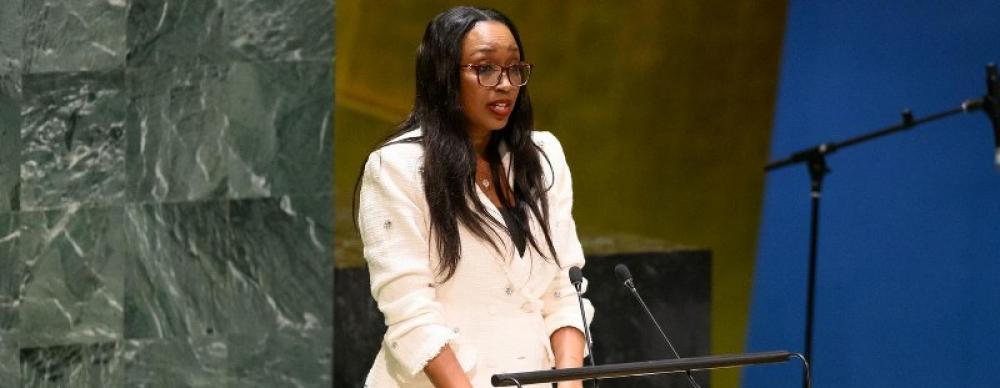Just Earth News | @justearthnews | 18 Jun 2023

Image: UN Photo/Loey Felipe
From institutionalized racism to genocide, the roots are the same, according to people on the frontlines of change who shared their stories with UN News ahead of the International Day for Countering Hate Speech, observed on Sunday.
Social media’s role in crushing hate speech
From COVID-19 to climate change, hateful exchanges among those with opposing views is a growing concern, said Latifa Akharbach, president of the High Authority of Audiovisual Communication (HACA) in Morocco.
The international community’s “failure” in managing and regulating migration “fuels the sponsors of hate speech” and helps them follow through with their plans, she said, calling on governments to adopt fair positions in the face of separation movements, terrorism, and violations of human rights.
She shared her perspective on the sidelines of the UN Alliance of Civilizations (UNAOC) ninth Global Forum, in Fez, Morocco, where a panel on countering and addressing online hate speech on social media had revisited the UN Strategy and Plan of Action on Hate Speech, launched on this day in 2019.
Dwindling diversity is another concern, said Faouzi Skali, president of the Fez Festival of Sufi Culture. Promoting diversity must be understood across the media domain and social networks, especially at a time when it is already disappearing around the world, he explained.
Noting that 100 languages are spoken by 95 per cent of the world’s population, he said only “12 of them dominate all digital communication on a planetary scale”. At the current rate, “we lose about one language a week”, he added, noting that there are only 6,000 languages left of the 20,000 spoken in the Neolithic era.
Pre-TikTok
Had social media existed in 1994, the genocide against the Tutsi in Rwanda would have been “much worse”, according to survivor Henriette Mutegwaraba, who recalled the hate speech propagated via radio at the time.
“A message that used to take years to spread can now be put out there, and in one second, everybody in the world can see it,” she said. “If there was Facebook, Tik Tok, and Instagram, it would have been much worse. The bad people always go to youth, whose minds are easy to corrupt. Who is on social media now? Most of the time, young people.”
‘Dark age of intolerance’
Mita Hosali, Deputy Director of the UN Department of Global Communication (DGC), said young people are often seen today as vectors of such toxic trends as online hate speech.
“Increasingly, we are entering this dark age of intolerance, fueled by polarization and mis- and disinformation, and there are all kinds of ‘facts’ swirling out there,” she cautioned.
“It’s like a ladder of incremental extremism,” Ms. Hosali said. “You start at the bottom with a stereotype, move on to emojis and memes that lead to harmful speech. Harmful speech leads to hate speech, a torrent of hate builds up, and results in the incitement of violence. And then you have actual violence.”
Tech companies must now show effective leadership and responsibility around moderation to set up guard rails for respectful online discourse, she said.
“It really boils down to leaders, whether they are political, business, faith, or community leaders,” she said, emphasizing that such efforts must also start within the family and ripple across all circles of influence so that ordinary people fight back against hate speech. “In my view, young people are the catalysts for change.”
Thinking equal
Leslee Udwin met hate up close when she interviewed perpetrators of a vicious, deadly gang rape of a young woman for her film India’s Daughter.
“These rapists and murderers had been taught to hate,” she said.
With this in mind, she said she put down her camera and launched Think Equal, a UN-supported programme operating in more than 50 countries and founded on the principles of former South Africa leader Nelson Mandela: no child is born hating another human being.
“It’s the very foundation for responsible global citizens for peaceful, inclusive, cohesive societies, and for human development,” she said. “We have to take responsibility, particularly in their early years. We are negligent if we do not take pains to create pro-social brains in our youngest, most vulnerable children, and that is what Think Equal is about.”
Changing history
Valika Smeulders, chief historian at Amsterdam’s Rijksmuseum, which held an exhibit, Ten True Stories of Dutch Colonial Slavery, at the UN, said academia and organizations like the UN Educational, Scientific and Cultural Organization (UNESCO) have been calling out museums since the 1990s to present more of the social history of slavery, the legacy of which permeates today’s society.
“It’s not just about history; it’s also about our common future,” she said. “The legacy of slavery is among us every day. We need to address that, especially all the types of discrimination and racism that are still around.”
Part of the solution is “to recognize that by understanding that past, we understand today’s society as well,” she said, adding that to have that conversation going on at the UN and having the exhibit as a ‘talking stick’ is “really important to us”.
‘No short cuts’
There are no shortcuts to making sure hate speech goes away, Ms. Hosali said.
Pointing to the #NoToHate UN campaign, she summed up a common thread, saying that “every one of us, in whatever walk of life we belong to, have to play a role”.
Find out more about what other people are doing to change the narrative with the UN's UNiting Against Hate podcast series, learn about how the UN is working to combat hate speech here, and test yourself with our quiz.